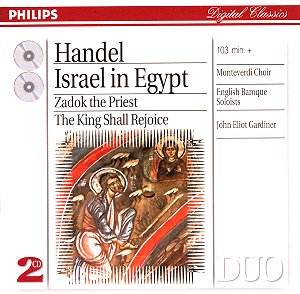Handel wrote Israel in Egypt in October 1738, when
he was 53 years old. This oratorio was intended to appeal to Christians
as a work for Lent, and to the important Jewish community in London
as a work suitable to Passover. Yet this work met little success - it
is a choral oratorio. In its original version, it had only four solo
arias and almost forty choruses - this did not fit with audience expectations
at the time. After a revival in 1756, Handel wrote that this work was
"too solemn for common ears".
These recordings, made live in 1990 and 1993, show
conductor John Eliot Gardiner at his peak. His brilliant control of
the Monteverdi Choir makes every choral movement a joy. This work features
a small number of solo arias; most of the movements are choral. Unfortunately,
the first of these arias, Their land brought forth frogs, sung by Ashley
Stafford, is not up to the standards of the rest of the work. Stafford's
voice wavers and his tone is vague and uncertain. But this is brief,
and the rest of the first part of this work is choir, and nothing but.
From the forceful He spake the word to the ethereal opening of Egypt
was glad when they departed, this first part is like a compendium of
choral "best practices". Gardiner coaxes every nuance from his singers,
yet does not neglect the orchestra, offering a perfectly balanced performance.
The sound is rich and full, with dense bass notes supporting the choir
in the loudest sections, and the lightest orchestral touches in the
quieter parts.
The second part of the work contains more solo arias
and duets. Almost every other movement is an aria, interspersed with
choral movements. This gives the second part a very different tone than
the first. Sopranos Ruth Holton and Elizabeth Priday give a moving rendition
of The Lord is my strength, but Holton's boyish voice lacks in richness
and strength. Alto Michael Chance is excellent in Thou shalt bring them
in. His limpid voice fits perfectly with the graceful orchestral accompaniment.
One thing that strikes a bit strange on this recording
is the use of several singers (such as three sopranos, two who sing
a duet and one who sings alone; four altos, again, spread out). This
is probably the result of this being a compilation of the best movements
from a series of live performances, where different soloists were used.
This detracts slightly from the overall unity, but the strength of the
choir makes it all worthwhile.
This fine recording of one of Handel's most chorally-intensive
works contains such excellent choral singing that it should be a benchmark
for this type of music. While some listeners may find that there is
too much choral music for their taste, others will delight in Gardiner's
masterful direction and conducting. In spite of the fact that this music
was recorded live, the sound is excellent.
Kirk McElhearn
